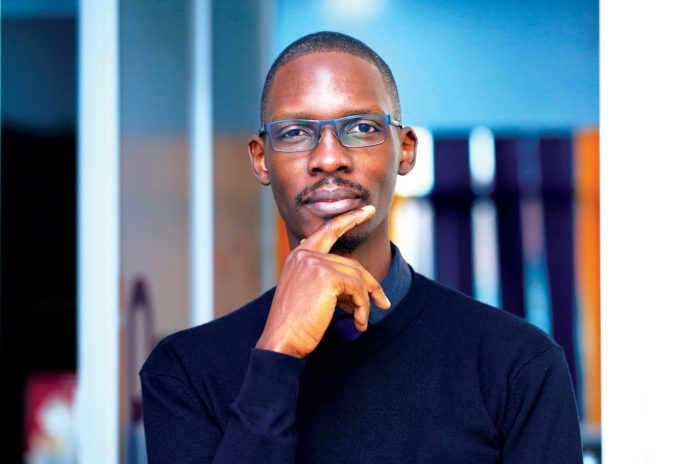Philip Nyamwaya is building ipay into one of Kenya’s most innovative payment companies
By the Hustle Team
When he talks about the payments industry, Philip Nyamwaya’s face lights up, radiating a deep passion for what he does. He is the co-founder and managing director of ipay, a leading payments gateway that serves a growing list of businesses, merchants, retailers, corporate organizations, and a host of companies in both the public and the private sectors. It enables them to make or receive payments in a safe, secure and affordable way.
“Essentially, we have packaged all the payments methods in the national payments system to create a product called ipay.”
He says that ipay allows customers and clients to transact using payment methods like M-Pesa, Airtel Money, Equitel, Eazzy 24/7, Pesalink, m-visa, Mastercard QR, as well as credit and debit cards. To meet the billing needs of customers, ipay has a billing component that enables users to make utility payments, including paying for internet services or buying airtime.
iPay has grown tremendously over the years to become one of the leading payments companies in Kenya. It has also expanded into other African countries, including Uganda, Tanzania and Togo. The company recently launched an affiliates program for rewarding ipay partners, including developers, programmers, designers, merchants, and individuals.
For the last eight years, Philip, a computer science graduate has been the company’s driving force. He has painstakingly built the firm to the fintech giant that it is today.
He reckons that business in borne in identifying a need and rising to satisfy it. And that’s what drove him to set up a payments gateway.
Philip’s entrepreneurship journey dates back to his days at the Jomo Kenyatta University of Science and Technology. As a young programmer, his dream mirrored that of most young people; to study hard, get a well-paying job in the corporate sector and rise through the ranks. The entrepreneurship bug bit him in his third year of study, when one of his campus friends, Ken Ngunjiri, introduced him to the world of entrepreneurship.
“He was a year ahead of me and was swamped with coursework and projects, so he requested that I help him with one of his client’s projects,” says Philip.
A self driven person, Philip worked extraordinarily hard to deliver the project. It paid off. His client, an elephant conservation NGO was satisfied with his work and engaged him for a long time.
“That was my big break,” says Philip, adding that the part-time job enabled him to raise his fourth year school fee.
Having tested the waters of self employment, he resolved to work on his studies with renewed optimism, with plans to plunge into the murky but promising waters of business after college.
In 2004, he teamed up with a friend, Steve Nyumba to start Intrepid Data Systems, an I.T startup. “We launched our company at a time when the wind of optimism was sweeping across the country. A new government led by Mwai Kibaki was a breath of fresh air for most businesses.”
Armed with their skills set, a big dream and the willpower to prosper, Philip and Steve took a leap of faith and set out on a journey. With sheer hard work, they were able to grow the fledgling firm into a thriving enterprise. So tremendous was their growth that they won several entrepreneurship awards within a few years of operation.
Despite a burst of prosperity, the two founders never relented. When M-Pesa was launched in 2007, Philip and Steve felt challenged to find a way of integrating the technology into their systems. They knew that innovation is the lifeblood of great entrepreneurs, and they were already thinking ahead of the curve. “Opportunity favors the prepared,” says Philip of his mantra that has seen him thrive as an entrepreneur.
He says that at around the same time, some merchants were enquiring about e-commerce. While e-commerce was popular in the developed world, it was a relatively new phenomenon in Kenya and the early adopters paid a steep price when making or receiving payments to or from abroad.
“The only available payments methods were PayPal and credit cards. However, these were very expensive services because of the many charges and surcharges,” says Philip.
One of the hallmarks of great entrepreneurs is their ability to spot opportunities and to pounce on them.
Nosing an opportunity, he developed ipay in 2008 and build it around M-Pesa. It allowed merchants to make or receive payments using M-Pesa.
Philip, who was by then pursuing a Master’s degree in software engineering was given the mandate to spearhead ipay operations.
In 2010, the board of directors at Intrepid Data Systems decided to separate ipay from its parent company, setting it on a pedestal.
Philip says that the company’s long and winding journey from a small internal project to a fully fledged payments gateway was punctuated by ups and downs, sometimes with hard lessons. These helped him steer the firm to the top.
Building the business wasn’t an easy sail for him. First, he had to co-locate physical servers at different data centers as cloud computing was still a relatively new area. “Like most other businesses, we had issues like internet outages that slowed our take off.”
“We have been through the valley. Despite the challenges, we live by our principles.” In 2011, the company was able to settle its technology locally, a major milestone.
Other milestones followed. In 2013, iPay won a bid to build a payment system for Jumia. In the same year, the company integrated all the available payment methods, including credit cards, into the ipay product. Before this, ipay was primarily handling M-Pesa payments.
“We wanted to give value across the board so we decided to be a payments gateway,” he shares.
Philip says that the firm was also part of a consortium that was handling payments for Kiambu and Taita Taveta counties, shortly after devolution of counties.
The company also created a payments system for Yum foods and worked closely with the Museums of Kenya to automate their payments. The firm reached one of its greatest milestones when it ventured into other markets, including Tanzania and Uganda.
“Our ethos is to listen to our customers. That has pushed us to continually evolve,” says the executive.
It’s not hard to see that iPay is on a growth trajectory. Having expanded into the East African market, it’s setting its eyes on other regions. Philip says the company is launching in Togo.
Can its success be replicated across Africa?
“ipay has been well received in most African countries. We have seen many people interacting with our product,” he says.
However, he notes that there are many other countries with dynamics similar to those of Kenya. These, he says could be the next frontiers for mobile money.
“In terms of technology, Kenya is ahead of its neighbors. However, Tanzania looks set to catch up.”
Listening to him talk about mobile commerce, you’ll immediately notice that he is bullish about the nascent industry.
According to the Communication Authority, Kenya has one of the highest mobile penetration rates in Africa. Given that most Kenyans access the internet using the mobile phone, there’s no doubt that mobile commerce is poised for explosive growth.
“When it comes to e-commerce, we have only scratched the surface. The infrastructure is there and companies are increasingly aligning themselves to make use of the existing infrastructure and value chains.”
To serve the huge number of Facebook entrepreneurs, iPay has built a product that meets all their payments needs.
Having built a thriving firm from scratch, Philip knows a thing or two about running a successful business.
He advises the youthful entrepreneurs to dream big but start small.
He says that they also need to be inquisitive and to aspire to be problem solvers.
“Honesty and integrity are some of the key values that you need to thrive,” he advises. Having encountered many challenges at the start-up stage, Philip is passionate about helping the youth to realize their full potential. He says that when he was studying computer science at the university, the institution didn’t have internet. Things have changed drastically and young entrepreneurs now have access to affordable and fast internet, cloud computing, and incubation centers. ipay’s affiliates program, he says, is creating a value ecosystem that rewards all of ipay partners.
“It’s so much easier to build lots of apps when we have a value ecosystem. We are happy to enable the youth to add more value to their customers.”
As far as the future is concerned, ipay wants to increase its footprint in Africa. In the meantime, Philip is doing what he knows best; simplifying the payment process for businesses.
Meet the boss:
• Philip has an undergraduate degree in computer science from Jomo Kenyatta University.
• He also holds a Masters in software engineering from University of Liverpool.
• Is a part-time lecturer.
• Lectures at both JKUAT and Strathmore universities.
• Is married.
• Grew up in an ordinary Kenyan family
• Is an avid reader.
• Currently reading “Dead Aid” by Dambisa Moyo
• Believes that reading opens up your world.
• Leaves office by 4p.m
• Creates time to be with his family.
• Spends time with his family over the weekends.













